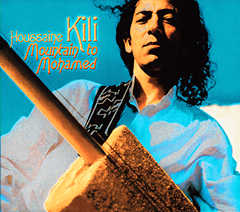"Mountain to Mohamed"
Houssaine Kili
| CD 68.818 |
 Kili is very much concerned with the rich variety of the musical styles of Morocco, he knows the musicians and their music, listens to their tapes, savors the rhythms and harmonies like wine from the hills of the Atlas mountains and at some stage the music of his homeland reappears in his own songs. Then the Berber does a tap-dance on the table (Attan) echoing a cover-version of a Moroccan star like Hamid Zahir (Lalla Fatima).
Kili is very much concerned with the rich variety of the musical styles of Morocco, he knows the musicians and their music, listens to their tapes, savors the rhythms and harmonies like wine from the hills of the Atlas mountains and at some stage the music of his homeland reappears in his own songs. Then the Berber does a tap-dance on the table (Attan) echoing a cover-version of a Moroccan star like Hamid Zahir (Lalla Fatima).
Kili makes the music palatable for our ears. He is like a filter for the musical culture of his country through which the richness of the Moroccan music can flow. On top of the traditional spheres of Gnawa, Rai, Chaabi and Berber sounds the pop classics of the sixties and seventies are Kili's greatest source of inspiration. Back then when he still had his band in Morocco they all played cover-versions of famous hits from Stevie Wonder, Neil Young, Jimi Hendrix and James Brown. That was the sound that the audiences loved and if the great stars themselves couldn't appear personally then at least their songs could be played. Kili's Moroccan Pop Distillery allows the good old Pop grooves to evaporate like dates under the midday Moroccan sun and in the end a music transpires that transforms the sounds of the seventies, Gnawa and the Berber grooves of Morocco to the Beat de Couscous 2001.
Morocco is a fascinating place for sensitive souls and has been for decades the destination of numerous musicians and writers. Paul Bowles wrote novels here, Jimi Hendrix heard the fascinating music of the Gnawas for the first time in Essaouira and Essaouira itself has become in recent years a main attraction for travellers from Europe and the USA. The annual festival of the city combines a variety of music forms, e.g. Gnawa music with Capoeira rhythms from Brazil, Rai stars from Algeria and drum & bass acts from England.
A special contribution to the booklet of Kilis new CD came from the famous moroccan writer Mohamed Choukri, who wrote about his relation to Kili. He describes Kili as a modern shaman, whos deep religious belief is expressed in the title of the CD. In the mountains close to his hometown Agadir one finds little temples, called marabouts. Their golden roofs reflect the midday sun and their interior is enlightened by candles. Entering the marabouts one can breath a litlle of the magic force called barraka. The people visit regularly these temples to collect a little barraka. Marabouts are build, wher saints and holy people have lived and worked and barraka is one of the most used words in the moroccan language, it is part of the moroccan live, of the peoples soul, it is the holy power that lives in everything. Also Kili finds his power in these places up in the mountains, wher he is closer to god, wher he finds the peace that can neither be found in hectic Germany nor in the vivid streets of moroccan cities.
Already Kilis first CD "Safran" from 1999 was a great success. Kili and his band played at several international festivals and performed at the Popkomm in Cologne and Womex in Berlin.
No 2 World Music Charts Europe 11/01
Reviews
"Mountain to Mohamed is a refreshingly uncontrived East-West fusion with a raw edge, distinguishing it from the more polished Parisian productions in a similar vein. Tunes like the catchy, jazzy rai-based title track and the haunting Allah are instant favourites. He's got a great soulful voice too."
FROOTS
"Drawing on the diverse elements of North African musical culture (from the deep traditions of gnawa to the good-time pop of the chaabi style), interwoven with folk, rock, funk, soul, even some hip-hop. OK so he's hardly the only North Afrcan based in Europe who's mixing it up lie that, but he's managed to gorge his own raw, natural style which stands out from all those Paris-based smoothies."
FROOTS
"Kili's scintillating CD comes highly recommended"
The Beat
"I can safely say that this is one of the most refreshing, exciting and interesting albums from North Africa that I have heard recently."
www.worldmusic.org.uk
"This release has enjoyed great success in Europe, and it's not difficult to understand how that happened. Kili, a Moroccan musician, is a rare talent and an artist with a keen ear for a wide variety of styles. Though the title track is steeped in the North African rai sound (despite decidedly American horn work), Kili's musical sensiblity also draws extensively on gnawa, Berber and chaabi influences. Kili also performs a pretty cool tabletop tap dance during "Attan" and possesses the intestinal fortitude to cover Neill Young's "Cowgirl in the Sand." Certainly a Moroccan would understand the sand part of the song, but Kili understands a lot more than that, and his cover is a treat. This is tour-de-force world music."
BILLBOARD
"German-based Moroccan Houssaine Kili, the brightest desert rose this reviewer has heard in the past year."
Afropop.org Banning Eyre
